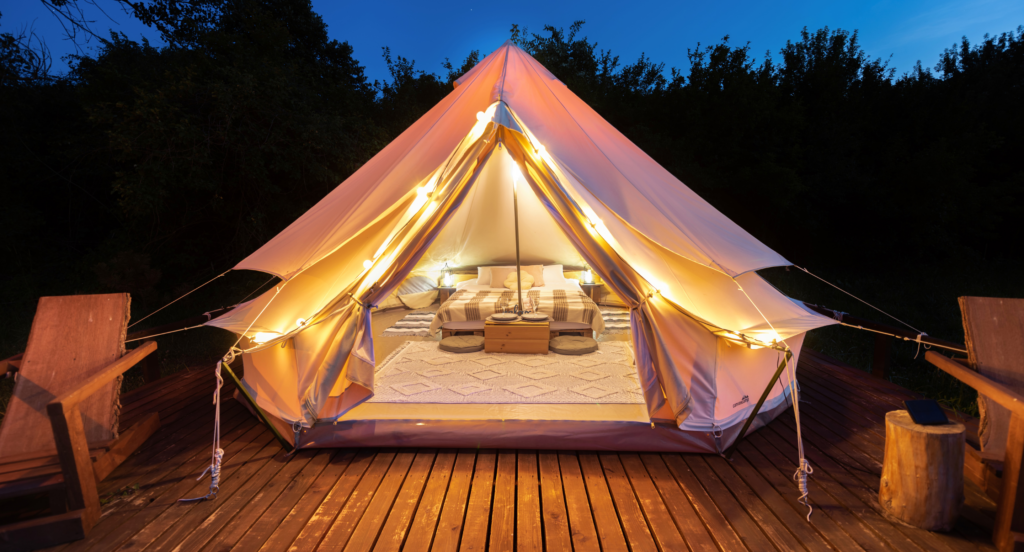Travel Trends Influencing Short-Term Rentals in 2025

Travel trends are re-shaping the short-term rental landscape, making 2025 a defining year for the industry. Now days travelers expect seamless, and personalized experiences.
With shifting behaviors and new tech trends , the demand for sustainable, and efficient experiences is shaping how vacation rentals operate.
And as consequence it’s pushing property managers to rethink how they cater to these evolving expectations.
Today’s travelers are searching for more—immersive local experiences, high-speed connectivity for workcations, and wellness-focused amenities that reflect their values.
For property managers, these changing expectations are both a challenge and an opportunity to innovate. These “features, once considered luxuries, are “commoditities” are now critical for staying competitive in the market.
Also leveraging tools such as AI, doesn’t only improves operational efficiency, but also creates a superior guest experience.
Reality is property managers who embrace these travel trends will attract more bookings but also build lasting relationships with guests. Millennials and Gen Z, who now dominate the travel market, are driving this shift toward experiential travel.
They prioritize authentic, local experiences, privacy, and flexibility—qualities that short-term rentals excel at offering. Companies like Airbnb have already set the standard, capitalizing on unique stays and expanding the supply of short-term rentals globally.
Let’s dive into the most impactful trends shaping the future of short-term rentals and how you can adapt to them.
Non- Traditional Accomodations

The traditional hotel experience is no longer the only option for travelers seeking accommodation during their journeys. Unique accommodation experiences have become increasingly popular, offering travelers the opportunity to stay in unconventional and memorable lodgings.
From treehouses, yurts to igloos, there is a wide range of unique accommodations available that cater to different preference.
These alternative provide a one-of-a-kind experience that allows travelers to connect with nature or culture on an intimate way.
Additionally, unique accommodations often prioritize sustainability and eco-friendliness, further enhancing the overall travel experience.
Staying in unique accommodations also adds an element of adventure and novelty to travel experiences. Whether it’s sleeping in a luxury tent or staying in a historic castle, these lodgings offer a sense of excitement that traditional hotels may not provide.
They also allow travelers to step outside of their comfort zones and embrace new ways of living, fostering personal growth and self-discovery.
Furthermore, unique accommodations often come with personalized services and amenities that cater to individual preferences, creating a more memorable stay.
Not only this but guests are craving more than just accommodation; they want connections with local culture. Property managers can stand out by offering unique, culturally immersive stays.
Airbnb’s Experiences allows hosts to offer unique activities, think guided tours of local landmarks or access to traditional cuisine.
Overall, these experiences let guests engage directly with the local culture and create unforgettable memories. Helping proeprty managers fostering loyalty in your guests.
Personalized and immersive experiences
In today’s world, the immersive experience has become an unstoppable trend for travel and experiences. Is transforming the way we interact with technology.
From virtual reality to augmented reality and mixed reality, these technologies are redefining how we experience from museums to concerts.
And of course, travel and short term rental is not the exception. With new experiences such as Airbnb’s Up house to staying at Prince’s Purple rain house.
With this is mind immersive experiences are not going anywhere, especially after the presentation of the icons category on “Airbnb” the trend is this will continue to grow on 2025.
But the process of transforming your listing into an immersive experience can be complicated and expensive.
Here are some ways to give guests a more immersive experience are:
- Adding a virtual tour in your listings, allows guests to move through the property and provide an experience before booking a stay.
- Offer guests personalized cultural experiences that can be tailor-made and to step out of the “tourist traps” of the local attractions.
- Partner with local vendors to offer unique and cureated “online experience” on Airbnb.

Additionally, supporting local businesses and artisans through authentic experiences contributes to sustainable tourism practices that benefit both travelers and host communities.
Overall, seeking out local experiences and authenticity adds depth and richness to travel experiences, allowing individuals to create meaningful connections with the places they visit.
Sustainability
Sustainable travel has become a major travel trend in recent years. Travelers are increasingly conscious of their environmental impact and are seeking ways to minimize it while exploring the world. This has led to a rise in eco-friendly accommodations and prioritize sustainability in their operations.
Guests are increasingly choosing properties that align with their eco-conscious values. Most commom practices to push for sustainability in your properties are:
- Recycling bins for trash and giving instructions to guests on how disposing them after the stay.
- Adding energy-efficient appliances in your property.
- Offering sustainable/green amenities during guest stay.
- Giving guests advoice on the house guide book on where to find bike rentals or EV charging stations
Only this can set your property apart and attract mindful guests.
Sustainable travel also encompasses supporting local communities, as well as respecting and preserving the cultural heritage of the places visited.
This can include participating in community-based initiatives, purchasing locally-made souvenirs, and engaging in activities that promote environmental conservation.
In particular, we can mention the Zoku Amsterdam hotel and short-stay apartments that adopted sustainability as a core principle by using solar panels, offering bicycles to guests, and using recycled materials in construction.
As well as, the Ecocapsule rentals in Europe provide off-the-grid stays, powered by wind and solar energy, attracting eco-conscious travelers who want to minimize their environmental footprint.
Ultimately, sustainable travel is about making a positive difference in the world while also enriching one’s own travel experiences.
Workcations and Digital Nomads
The rise of remote work has revolutionized the way people approach their careers and lifestyles. With the ability to work from anywhere with an internet connection, many individuals are taking advantage of this newfound flexibility.
This trend, known as “digital nomadism,” has opened up a world of possibilities for those seeking to explore new destinations. Remote work and travel allow individuals to immerse themselves in different cultures, experience new landscapes, and connect with people from around the world.
Marketing your property as a workcation-friendly destination can help you tap into this lucrative segment. Selina, a hospitality brand focused on digital nomads, offers coworking spaces, high-speed internet, and networking opportunities in various destinations.
Another example is Remote Year, a community that brings together global workers seeking to combine work and travel worldwide, providing accommodations, workspaces and curated experiences.
Overall, remote work and travel offer a dynamic and enriching lifestyle that empowers individuals to live life on their own terms.
Tech-Enhanced Hospitality
Technology has completely changed the way we travel, from planning and booking trips to navigating new destinations and staying connected with loved ones back home.
The rise of AI-driven platforms will continue to streamline property management operations. From automating cleaning schedules to personalizing guest communications, AI will allow property managers to save time and increase efficiency.
It will also further improve guest relations by analyzing booking patterns to suggest optimal pricing strategies and personalize guest stays based on preferences.
The Plum Guide uses AI to select and certify the best vacation rentals by analyzing guest reviews, property photos, and host responsiveness, ensuring a consistently high standard of properties listed on their platform.
We also have our partners Hostaway, who integrate with AI tools to automate guest communications, optimize pricing, and streamline cleaning schedules for vacation rental managers, allowing them to focus on enhancing guest experiences .
Technology remains at the forefront of convenience. Features like keyless entry, smart home integrations, and contactless check-ins offer ease and efficiency, while maintaining a personal touch can enhance guest satisfaction. Balancing tech-driven operations with genuine human interactions will be the key to success.
The integration of technology into accommodations has also improved convenience and comfort for travelers, with smart room features and digital concierge services becoming increasingly common. Overall, technology integration has streamlined the travel experience, making it more efficient, accessible, and enjoyable for individuals exploring the world.
Emerging Travel Trends
And before wrap this article up, there are a copuple of new trends to watch out for this 2025! Take a look:
Wellness Travel:
The global focus on health and wellness has created a booming market for wellness tourism. Properties equipped with yoga mats, in-room fitness equipment, or partnerships with local spas are gaining an edge.
Offering activities like meditation retreats or guided nature hikes on platforms like Airbnb can further enhance your appeal to wellness-focused travelers.
Slow Travel:
As travelers seek to escape fast-paced itineraries, slow travel is becoming more popular. Guests are choosing extended stays to truly experience their destinations for a home-away-from-home feel.
Property managers can attract these guests by offering discounts for longer bookings and creating packages that promote meaningful, locally immersive experiences.
Agriturismo accommodations in Tuscany, Italy, encourage extended stays by providing guests with a chance to live like locals—offering farm-to-table meals, vineyard tours, and quiet countryside relaxation.
Film Tourism:
TV shows and movies are driving destination choices, with fans seeking locations featured in their favorite media. For example, Airbnb did a collaboration with Barbie to host in Ken’s dream house in Malibu California.
If your property is near a trending location or offers a themed experience, leveraging this connection in your marketing can attract niche travelers. Game of Thrones fans flock to Dubrovnik, Croatia, which served as King’s Landing in the series.
Many rentals in the area highlight their proximity to filming locations in their listings.
Overall, these trends show a move towards travel experiences that focus on being present real, flexible or healthy while offering unique chances to explore different cultures and landscapes around the world.
As these trends keep shaping the future of travel, it is important for property managers and owners in the STR industry to accept and adapt to these changes.
This will help create more inclusive, sustainable, and resilient tourism practices that benefit both travelers and host communities.









